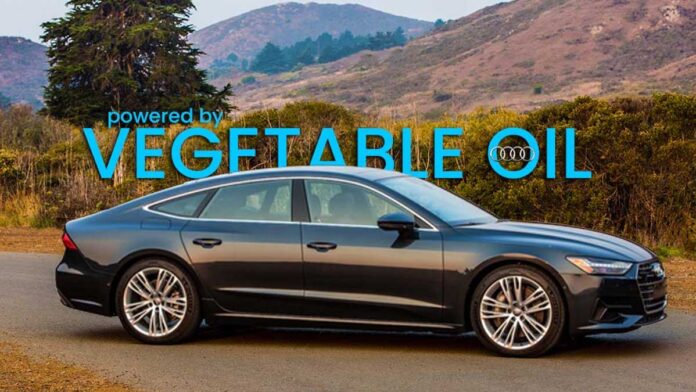Audi claims that hydrotreated vegetable oil (HVO) will be compatible with its six-cylinder turbo-diesel engines producing up to 210 kW (281 hp) of power. The company’s pursuit of decarbonization and carbon neutrality within its model portfolio before 2030 has culminated in the use of this technology to produce renewable fuel.
Audi A4, A7, Q7, and Q8 are equipped with the V6 TDI powerplant and have been chosen for the next stage for decarbonization, according to a press statement. Audi has also revealed that starting mid-February, all the selected vehicles will be able to work with HVO.
The car manufacturer from Ingolstadt has claimed that it will continue to develop more vehicles that can use hydrotreated vegetable oil in the future.
Audi’s Development Officer, Oliver Hoffman, said,
Read also : Pakistan and China to increase telecom traffic with new optic fiber connections
We’re optimizing our existing combustion engine portfolio for more efficiency and lower emissions. One way we’re doing this is by creating the requisite technical foundations for the use of sustainable fuels such as HVO.
Powertrains such as the R4 TDI installed in vehicles like the A4, A6, A7, and Q5 have been certified in Sweden for HVO use since the middle of last year,
HVO and its Advantages
HVO is a renewable biofuel created from excess or waste materials such as vegetable oils from the food sector or agricultural residue. The material is converted into aliphatic hydrogen by combining these substances with hydrogen. Aliphatic hydrogen is compatible with diesel engines and can replace fossil elements in fuels, blended with conventional diesel fuel, or utilized as a pure fuel on its own.
Utilizing HVO instead of conventional diesel is beneficial for reduced CO2 emissions, cleaner combustion, and increased combustion efficiency.
The Head of Powertrain Development for V-TFSI, TDI, and PHEV at Audi, Matthias Schober said,
As the cetane rating of HVO is around 30 percent higher, the combustibility of the engines is enhanced. The positive effects of this are particularly noticeable when cold starting. We tested the effects on various components, the performance, and exhaust emissions in specific validation runs before granting approval.
Currently, over 600 filling stations across Europe offer renewable fuels, while HVO availability is expected to increase further.
Contribution of Automakers Towards Carbon-Neutrality
Considering Audi’s big steps towards its carbon-neutral initiative, other automakers such as Porsche and McLaren have already made tremendous progress in their pursuit of the best synthetic fuel.
Additionally, as the supply and demand for electric vehicles increases, the aging internal combustion engines (ICE) will be more strained. Such biofuels and other synthetic fuels could be the key to keeping ICEs alive in the car industry.

